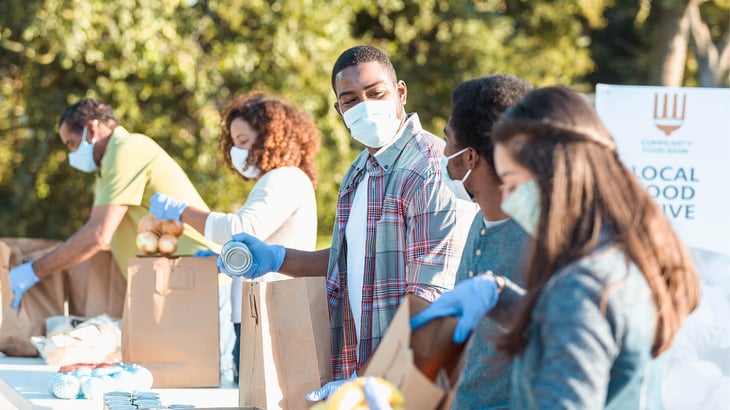Leading with Intentional Engagement
Reaching out to others about Jesus Christ requires learning about them, their perspective, and the place that they are coming from. Most important, it requires intention. Read an excerpt from Faith That Engages the Culture by Rev. Dr. Alfonso Espinosa below to see how important intentional engagement is when witnessing to others.
Parenting Lessons from Fruit of the Spirit
As a mom to two children under the age of five, I am constantly in the throes of laying groundwork for what I expect and teaching boundaries in a world that doesn’t seem to expect boundaries at all. However, as I have conversations with moms who are in the later stages of parenting, I am starting to understand that conversations about boundaries and expectations aren’t going anywhere anytime soon!
In our house, we are navigating these conversations about boundaries and expectations using the fruit of the Spirit from Galatians 5 to shape our framework. As we work through difficulties with sharing toys or taking turns, the fruit of the Spirit gives us a great framework and simple language to use to help our littles understand how to treat one another. Inevitably, we face many moments when our actions (both on the part of the children or the parents—or both—in our house) not only need an apology but, more important, these moments need forgiveness.
Pruning Is a Gift from God
In John 15, Jesus uses a vine and its branches to teach us about spiritual growth. Our spiritual fruit is the fruit of the Spirit: love, joy, peace, patience, kindness, goodness, faithfulness, gentleness, and self-control. In order to bear spiritual fruit, we have to be connected to the vine. Sometimes, even though it may cause suffering, we have to be pruned. God’s pruning process produces a bountiful harvest.
Three God-Given Ways to Support Your Mental Health this Summer
I’m so glad it’s summer.
There are many reasons for this—sunshine! patio dining! sundresses! But the number one reason is that it’s simply not winter.
Planting God's Word through Connection and Sharing
This is an adapted excerpt from Connected to Christ: Witnessing in Everyday Life by Mark A. Wood.
There is so much to say about Jesus that it can be hard to find a place to start. But because there is so much to say about Jesus, there’s something in Jesus’ story to share with everyone. You can be confident that there is something in Jesus’ story that relates to the person you are conversing with because Jesus’ story connects to every human being. Your challenge as His witness is to determine something to share that is meaningful for and interesting to the other person. You can do that by seeking out a point of connection between Jesus’ story and the other person’s story.
How Creativity Brings You Closer to God
My son, who loves to spend time drawing, has a hard time with his drawings not turning out exactly how he envisioned them in his mind. For a long time, he would only spend time drawing if I was going to draw with him and draw everything the ‘‘right way.’’
Hate Destroys While Love Restores
Ann Landers once wrote, “Hatred is like an acid. It can do more damage to the vessel in which it is stored as well than to the object on which it is poured.”
Finding Hope in the Messy Middle of Life
This time last year, I had a notebook full of unruly notes and an awareness that the messes all around me weren’t all there is to life.
I had zero idea on how to form my unruly notebook into a book. My thoughts overflowed onto page after page without any boundaries or order. I turned to my friend, Sarah, and said, “Help me name this thing, this feeling, this truth—there are messes in life that I have very little control over. Some of it is caused by overt sin, mine, yours, everybody’s. But sometimes the mess just is. It looks like mental health challenges and other health problems, relationship struggles that have very few good answers, or earthquakes, floods, loss.”
What is God Calling Me to Do?
This is an adapted excerpt from Walking Together: Simple Steps for Discipleship by Ted Doering.
What is God saying? This is a question about knowledge. What is God calling me to do? This question applies that knowledge in your life. What is my next step? Here, we take that knowledge and application and put it into practice. Now, this is specifically phrased. The question is not about some long-term plan, your destiny, or a mountaintop experience. It’s literally about your next step. On a long journey, sometimes the only thing that can be done is to focus on one more step.
Advice for Christian Pioneer Parents
I will be what one Christian author and speaker would call a pioneer parent. Pioneer parents are mothers and fathers who did not have the examples of Christian parents to follow in their own childhood. I, simply put, without the help of the Holy Spirit, have no clue how to raise my future children in the faith. I didn’t grow up going to Sunday School, saying bedtime prayers, or attending church. How will I parent in a way that reflects and teaches the Gospel of Jesus Christ to my children?



























